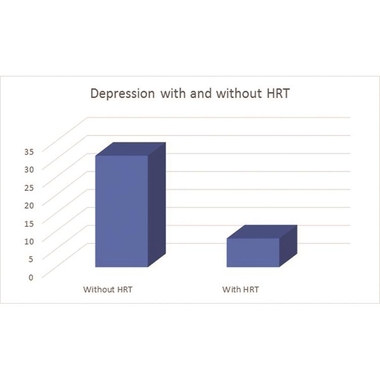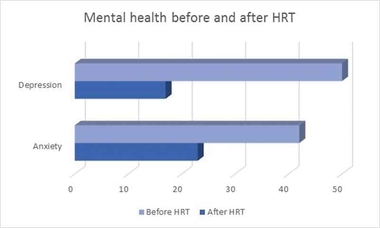Why HRT matters beyond the physical

by Hayden Smith
Staff Writer
July is Minority Mental Health Awareness Month. This is a time to recognize how society’s marginalization creates tangible effects in how every minority interacts both with the world and with themselves, namely via higher rates of depression and anxiety.
For many, treatment for depression, anxiety and related mental illnesses often involves psychiatric medication, talking with a therapist or some combination of both. For transgender people, treatment often involves another type of therapy: hormone replacement therapy or HRT.
Though not all transgender people want or need a physical transition, many of us fight to start the process. For trans men, that usually means taking testosterone. For trans women, that usually means taking estrogen, antiandrogen and progesterone.
Both anecdotally and scientifically, HRT has proven to alleviate mental illness symptoms and mental distress in transgender people.
One study found in the Journal of Psychoneuroendocrinology in 2012 split 187 transgender people into two groups: those who were undergoing hormone replacement therapy and those who were not having treatment. Looking at symptoms of depression in both groups, they found significantly higher percentages in the group without treatment at 31 percent than the group with treatment at only eight percent.
Another study in 2014 found that for 118 trans people, their rates of depression went down 13 percent and rates of anxiety went down 33 percent after only 12 months of hormone replacement therapy.
According to Allison, a transgender woman who has been on HRT for more than a year, the anxiety and depression started to “slow down.”
“The anxiety over my body being one with my mind was removed as did the depression of the same aspect.”
It was a double-edged sword when it came to feeling more in-tune, she said. “Emotions are much stronger, communication is greater and so is the fear of acceptance.”
Gianna, another transgender woman, says that hormones for her and many others feels like being “enlightened.”
“It's like all of a sudden my body and mind were in harmony after 36 years,” Gianna says. “Of course, the physical effects never happen as fast as you want, but you have to adjust yourself and learn this brand new out of the closet version of you.”
Whether this ease comes from the chemical side of hormones or from physical dysphoria that lessens as the body changes is a bit of a toss-up.
Allison thinks it may be a combination of the two, especially judging by how some trans people’s depression comes back. “I will say that the depression that was once eliminated because your body has the right hormones now goes into depression because of a lack of acceptance.”

Whether the high rates of depression and anxiety are purely hormonal, purely societal or a combination of the two, evidence still shows that hormone replacement therapy is an invaluable treatment for the transgender people who need it.
Above all, though, treating gender dysphoria goes beyond simply physical transition.
“HRT and surgeries and all that can help,” says Gianna, “but they don't cure anything. You are relearning what it is to be you authentically. That is something most people never experienced before.”
While hormones may not be a cure-all, they are a step up for many transgender people to becoming the healthiest version of themselves.
Copyright 2017 The Gayly – July 22, 2017 @ 1:15 p.m.





